LOVE FEST FOR MTT: April 26, 2025
San Francisco knows how to throw a Love Fest. For Michael Tilson Thomas’s 80th birthday, nothing better than the best of the best could do. MTT, as he is called, is now Music Director Laureate of the San Francisco Symphony, Conductor Laureate of the London Symphony Orchestra, and co-founder and artistic director laureate of the New World Symphony. He has won 12 Grammy Awards and conducted all the major orchestras in Europe and the US. However, San Francisco thinks of MTT as ours. His active participation in the life of the SF Symphony and through that making the City as home; that’s why the completely packed Davies Symphony Hall, even in the partial view seats, started teary and smiling and sharing stories before the concert began. San Francisco loves MTT, and we believe he loves us, too.
MTT has been living with a brain tumor. Still, he has come back to conduct first twice a year and then once a year. If you are wondering how he could conduct, his ability to conduct is still there. No question. What is gone is the physicality of his former conducting. There were the jumps, the great reach to the roof, both arms crossing together from left to right and then indicating one section or player with his baton. Oh, there were also the deep knee bends. He danced with force.
The first time MTT conducted the SF Symphony they played Mahler’s 9th. He became the Music Director in 1995. We need to remember that MTT’s Mahler concerts were so well known and admired that MAHLER was written on the side of Muni Buses.
MTT conducted two lengthy pieces, one at the beginning of the birthday program and another at the end. The opening was Benjamin Britten’s, Variations and Fugue on a Theme of Purcell, Opus 34 (1946). It is also called The Young Person’s Guide to the Orchestra. While it might have educational aspects, it is, as Michael Steinberg wrote, “the work is very much worth playing for its sheer musical pleasure.” The music’s theme comes from Purcell’s revival of Abdelazar, or the Moor’s Revenge, a play by Aphra Behn. The music first identifies one section of instruments – maybe strings or percussion and the others. Then, Britten puts the orchestra back together in a fugue; he has themes for each section. The instruments play them one at a time and then together. It is happy, playful music which is not at all superficial; it brings music that bows and smiles. Wonderful choice.
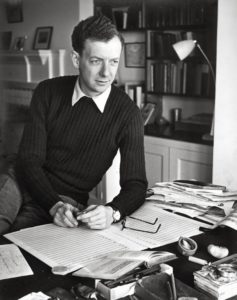 Benjamin Britten, composer (1913 – 1974)
Benjamin Britten, composer (1913 – 1974)
MTT also conducted Overture from Khantshe in Amerike, by Joseph Rumshinsky (arr. MTT), a composer originally from Lithuania and then lived in New York. He came to the US in 1904 because Boris Thomashefsky, MTT’s grandfather, asked him to come. Rumshinsky aided the Yiddish Theater and created it as a source of fine operettas. MTT produced The Thomashevskys: Music and Memories of a Life in the Yiddish Theater. Its premiere was at Carnegie Hall, 2005. I was thrilled to be in the audience for his presentation of The Thomashevskys on the Davies Symphony Hall stage. It was fun and touching with MTT’s music and music from the early 20thc.
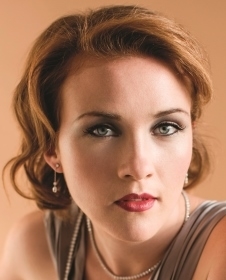 Sasha Cooke, mezzo soprano
Sasha Cooke, mezzo soprano
The next section of the celebration presented seven songs, five of them by MTT. Of the two that were not his were Claude Debussy’s La flute de Pan from Chansons de Bilitis (1897), sung by Frederica von Stade, mezzo soprano, John Wilson at the piano. Frank Loesser’s Take Back Your Mink, from Guys and Dolls (1950). The singers were stars. Three of them, Ben Jones, tenor; Jessica Vosk; and Sasha Cooke, mezzo soprano, got their career starts with help from MTT. Frederica von Stade and MTT have worked together since 1970. In Take Back Your Mink, the SF Symphony Chorus women added lively singing, dancing, and swinging somethings not mink. MTT’s songs are tender, sometimes ironically funny, personal in ways that most everyone thinks. The titles tell it: “Not Everyone Thinks That I’m Beautiful” (1985); “Drift Off to Sleep” (1982); Answered Prayers, 1974. The songs were a special way to know more of MTT. Unlike some other conductors who write music, Michael Tilson Thomas very rarely put his own work on an SFS program; it was his songs I most wanted to hear this night.
The after intermission concert started with a beautiful MTT song titled “Grace.” (1988) Sasha Cooke and Frederica von Stade gave the song thoughtfulness and shading of emotions. Very lovely. John Wilson on piano. The SFS Chorus, directed by Jenny Wong, reached into the heart of the music by Leonard Bernstein, the Finale from Chichester Psalms (1965). As Bernstein and MTT were good friends, it was the right selection for this birthday.
One more terrific, long piece to close the show; it was MTT conducting Roman Festivals (1928), by Ottorino Respighi. The movements are four festivals. Each one has a different energy and a different sound, rhythm, character. I had never heard it before and enjoyed it very much. The different movements included: Games at the Circus Maximus, The Jubilee, The October Festival, and The Epiphany.
 Planning a program is an art. Our Maestro made wise choices for what he would conduct. Excellent music that might not be the “usual” thing, two long pieces which had interesting changes of emotion and rhythm, and, most of all, demonstrated that despite his condition, MTT, you’ve still got it.
Planning a program is an art. Our Maestro made wise choices for what he would conduct. Excellent music that might not be the “usual” thing, two long pieces which had interesting changes of emotion and rhythm, and, most of all, demonstrated that despite his condition, MTT, you’ve still got it.
Photos by Stefan Cohen, courtesy of SF Symphony
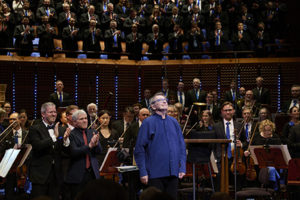


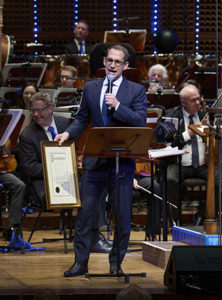
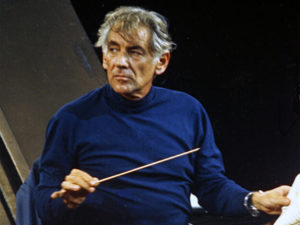
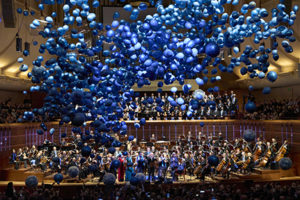
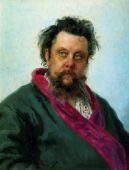 Modest Mussorgsky (1839-1881)
Modest Mussorgsky (1839-1881) 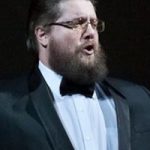 Stanislav Trofimov sang the role of Boris Godunov
Stanislav Trofimov sang the role of Boris Godunov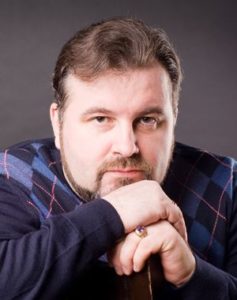 Yevgeny Akimov portrayed Prince Shuisky
Yevgeny Akimov portrayed Prince Shuisky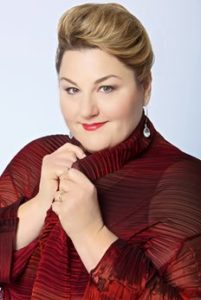 Catherine Cook appeared as the Innkeeper.
Catherine Cook appeared as the Innkeeper.
 Left: Wiliam Shakespeare (1564-1616; Right: Alexander Pushkin (1799-1837)
Left: Wiliam Shakespeare (1564-1616; Right: Alexander Pushkin (1799-1837)